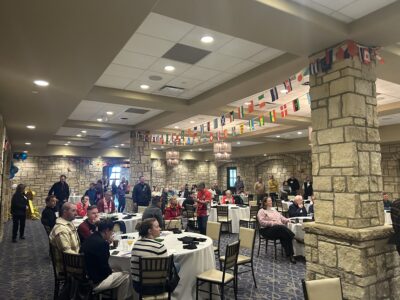District Court issues verdict in favor of City of Lawrence in church’s lawsuit to halt nearby development project

photo by: Cynthia Hernandez/Journal-World Photo
The east entrance of First Presbyterian Church, 2415 Clinton Parkway, is seen on Friday, March 22, 2024.
A judge has ruled in favor of the City of Lawrence in a church’s lawsuit that sought to halt the construction of more than 60 duplexes on property across the street from the church.
With the ruling, an attorney representing the duplex project’s group of developers says that the project now would be able to move forward — but that it’s also unclear “how far the church wants to take this.”
The attorney, Greg Musil, shared a case filing explaining the decision with the Journal-World Tuesday morning. Musil represents Dallas-based Fountain Residential Partners, the developers that First Presbyterian Church sued alongside the city in an effort to halt a project that would combine two lots at 2300 Crestline Drive — located across the street from the church property — into an approximately 9-acre site and build a more than 300-bedroom apartment complex.
Plans for the project — filed all the way back in 2020 — call for the apartment complex to include a little more than 60 smaller buildings, each housing two duplex-style units. Each of those buildings would be two to three stories tall, and they would surround on three sides one other neighboring property: the Lawrence Child Development Center, a day care at 2333 Crestline Drive.
In the lawsuit, the church questioned whether city code limits the number of duplex structures that may be located on a single lot. The suit has been working through the court process since it was first introduced in late 2021. It was dismissed a few months later, revived in mid-2023 after a successful appeal and returned to Douglas County District Court for a bench trial earlier this year.
The trial took place in early March, after which the court took the issue under advisement. According to the filing shared with the Journal-World Tuesday, District Court Judge Mark Simpson found that First Presbyterian’s petition was denied because the city’s approval of a site plan for the 2300 Crestline Drive property was lawful.
That decision came after the court considered elements like the evidence admitted as part of the trial, the historical background and circumstances surrounding the city code’s enactment and the text of the city’s code in its entirety.
“This analysis demonstrates that the intent and purpose of the definition of duplex in the city code is to allow more than one duplex per lot subject to base district rules and density and dimensional standards,” the filing reads.
In the city’s code, a duplex is defined as “a single structure that contains two primary dwelling units on one lot,” which may share common walls, floors or ceilings.
The filing states that there are places elsewhere in the city code that specifically limit something to one per lot, such as one example for a zoning district where “only one principal building per lot is permitted in this district.”
“When the commission intended to limit something to one per lot, it used the phrase ‘per lot,'” the filing reads. “… If the commission wanted to limit duplexes to one duplex per lot, the city code would say that only one duplex per lot is allowed. The fact that the definition of duplex does not contain the ‘per lot’ language indicates an intent not to limit the number of duplexes per lot.”
Musil told the Journal-World Tuesday evening that the court allowed the church to conduct the discovery process, which includes the submission of written “interrogatories” and request for the production of documents, and also allowed the church to take depositions and present witnesses at trial.
“However, no one knows if the church is going to continue to drag this out by filing another appeal or whether it will accept the local court’s decision,” Musil told the Journal-World. “It would truly be unfortunate if the housing promised by this project continued to be delayed by the church extending the litigation.”







